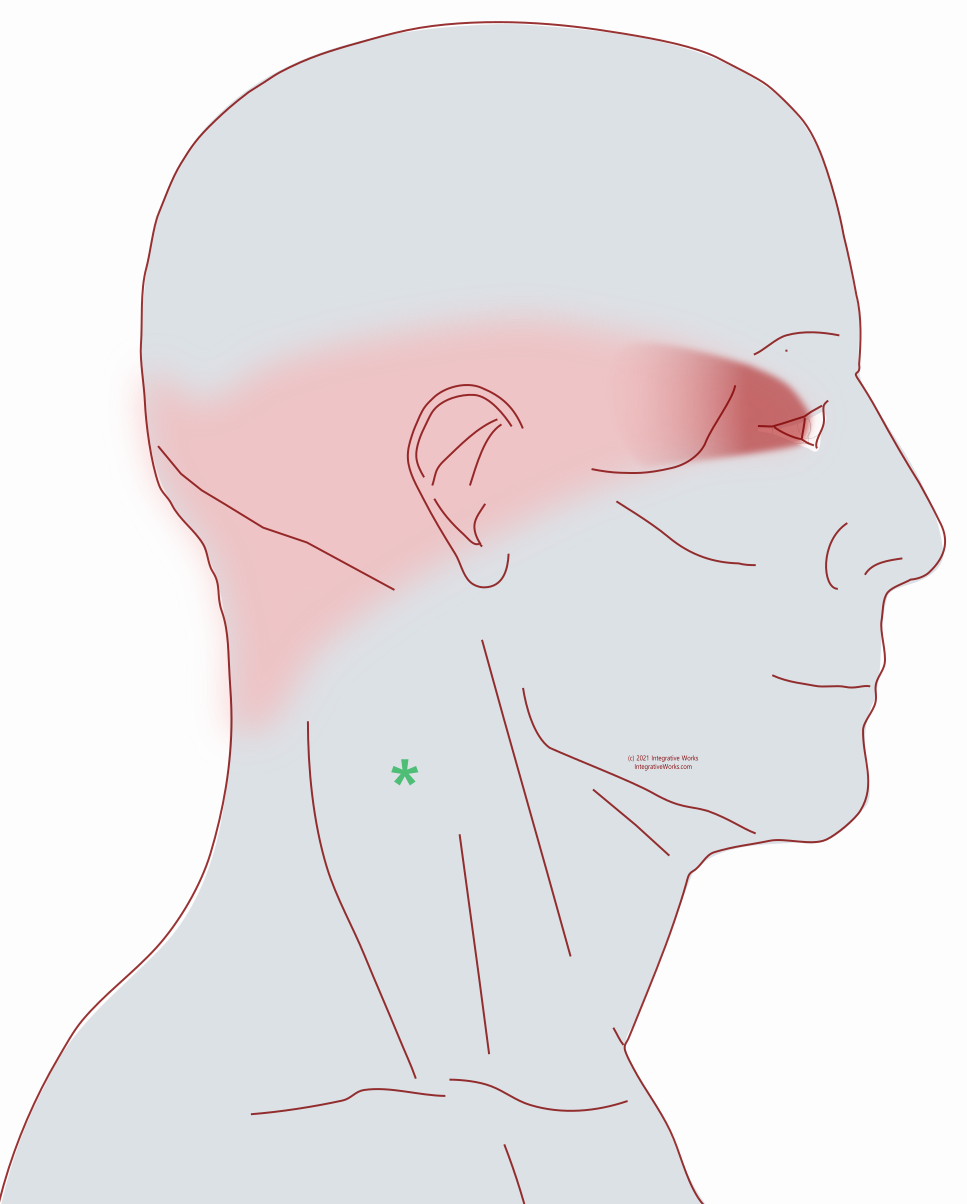Neck-ache Headache, Eye-ache
Table of Contents
- How People Describe This Pain Pattern
- How You Activate and Intensify This Pain Pattern
- Self-Care – Getting Relief on Your Own
- Musculoskeletal Anatomy Behind Your Pain
- Therapy Notes for Massage and Bodywork
Want to skip ahead?
Here’s a link to my post about
getting relief on your own.
How People Describe This Pain Pattern


With this pattern, people complain of a headache behind the eye. That’s not enough information. When the headache pattern is severe, they may trace the pattern with their hand. Starting from the back of their neck, they move along the side of their head. Then, they focus their fingertips on the eye.
There are several headache patterns in the eye, so I always ask for as many specifics as possible. Often regular clients are more aware of their pain patterns. And they’ve learned how to communicate the issue. Here, they tell me that it comes out of the neck and creates pain through the middle of their head. Often, they touch the spot of the trigger point complaining of tension and stiffness there. I will then usually find muscle is stiff or swollen along the side of the pain.
Anxiety and Blurred Vision
Usually, people don’t usually talk to their massage therapist about blurred vision or anxiety, but this trigger point is associated with those symptoms. I have often found this in special needs children that are stuck in fight-or-flight. These symptoms seem to clear up quickly when the trigger point is released. However, if it is an adult, I ask them about their vision and anxiety before and after to help them make the connection.
How You Activate and Intensify This Pain Pattern
Often, a sharp forward bend in the base of the neck with a turn to one side aggravates this trigger point. In addition, this posture is more likely to create tension in the eye and blurred vision.
It is one of the most common pain generators in Forward-Head Posture. The self-care post has exercises that help to resolve long-term postural patterns that perpetuate the trigger points in this pain pattern.
This trigger point creates one of the headaches you can get from craning your neck as you jut your chin forward and down to look at your laptop.
This trigger point is also a typical pattern that arises when dealing with the problems related to whiplash.
The Musculoskeletal Anatomy Behind Your Pain
Musculoskeletal Anatomy
This post on anatomy contains standard information about the origin, insertion, function, and innervation of muscles. Additionally, it includes information on functional considerations and anomalies.
Find Related Posts
Anatomy posts have a grid of all related posts. This includes posts on pain patterns, self-care, therapy notes, NMT protocols, cranial techniques, and cases.
Getting Relief on Your Own
Clinically Proven
Self-Care Strategies
This post has stretches, exercise, and changes in your activities for relief from this trigger point pattern.
Therapy Notes for Massage and Bodywork
Better Bodywork
Through Shared Expertise
This post has techniques, tips, treatment routines, and anatomy illustrations to improve the bodyworker’s approach.
Support Integrative Works to
stay independent
and produce great content.
You can subscribe to our community on Patreon. You will get links to free content and access to exclusive content not seen on this site. In addition, we will be posting anatomy illustrations, treatment notes, and sections from our manuals not found on this site. Thank you so much for being so supportive.
Cranio Cradle Cup
This mug has classic, colorful illustrations of the craniosacral system and vault hold #3. It makes a great gift and conversation piece.
Tony Preston has a practice in Atlanta, Georgia, where he sees clients. He has written materials and instructed classes since the mid-90s. This includes anatomy, trigger points, cranial, and neuromuscular.
Question? Comment? Typo?
integrativeworks@gmail.com
Follow us on Instagram
*This site is undergoing significant changes. We are reformatting and expanding the posts to make them easier to read. The result will also be more accessible and include more patterns with better self-care. Meanwhile, there may be formatting, content presentation, and readability inconsistencies. Until we get older posts updated, please excuse our mess.